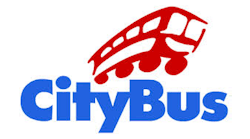CityBus and Purdue University Team Up to Revitalize Transfer Center Rain Gardens
Pollution of the Wabash River is a major concern in Lafayette, and stormwater runoff plays a significant role. When rain washes across hard surfaces like roofs and roads, it picks up pollutants and carries them to the sewer and river. Installing green infrastructure such as rain gardens helps to filter out pollutants before rainwater reaches the river. CityBus enacted help from students in the Environmental and Ecological Urban Water Projects course at Purdue University to refurbish its rain gardens and bring them back to life so they would function more effectively.
“We were thrilled with the opportunity to partner with the Urban Water Projects students in order to really bring new life to our rain gardens and make them not only a beautiful part of our landscape, but also something that is truly functional and eco-friendly,” said Marty Sennett, general manager. “These improvements will hopefully make a positive impact for years to come and help protect the Wabash River.”
Students collaborated with CityBus to develop a vision and plan for the space. This included selecting native plants that would be able to handle the amount of sunlight and salt in the area, as well as tolerate the amount of stormwater runoff received. They had to design a landscape that would effectively direct the flow of water and decide where each type of plant would go to maximize results.
The final project included five different types of native plants, repair of existing drainage systems, and the installation of river rocks to guide water flow throughout the area. With these improvements in place, the rain gardens will be able to manage the stormwater runoff and filter pollutants out of the water as it absorbs naturally back into the ground. This helps to keep these potential toxins out of the sewer system and Wabash River. Students estimate that the rain gardens collect around 243,700 gallons of water annually.
Ashley Van Wormer, a senior in Civil Engineering, explained, “This project is far larger than just making the Transfer Center a nicer looking place; this project is designed to educate people on and promote the use of greener practices to help improve the local environment’s overall health.
Native plantings like the ones found at the CityBus Center help to directly improve the health of the Wabash and the surrounding areas.” Signs will be placed throughout the rain gardens educating visitors on their purpose and benefit.
Nearly 2,000 plants were planted at the CityBus Center, and the organization is excited to have its rain gardens revitalized so they can once again play an important role in supporting the health and cleanliness of the Wabash River. The public can view the rain gardens and learn more about their benefits by visiting the CityBus Transfer Center at 316 N. 3rd Street in Lafayette.



